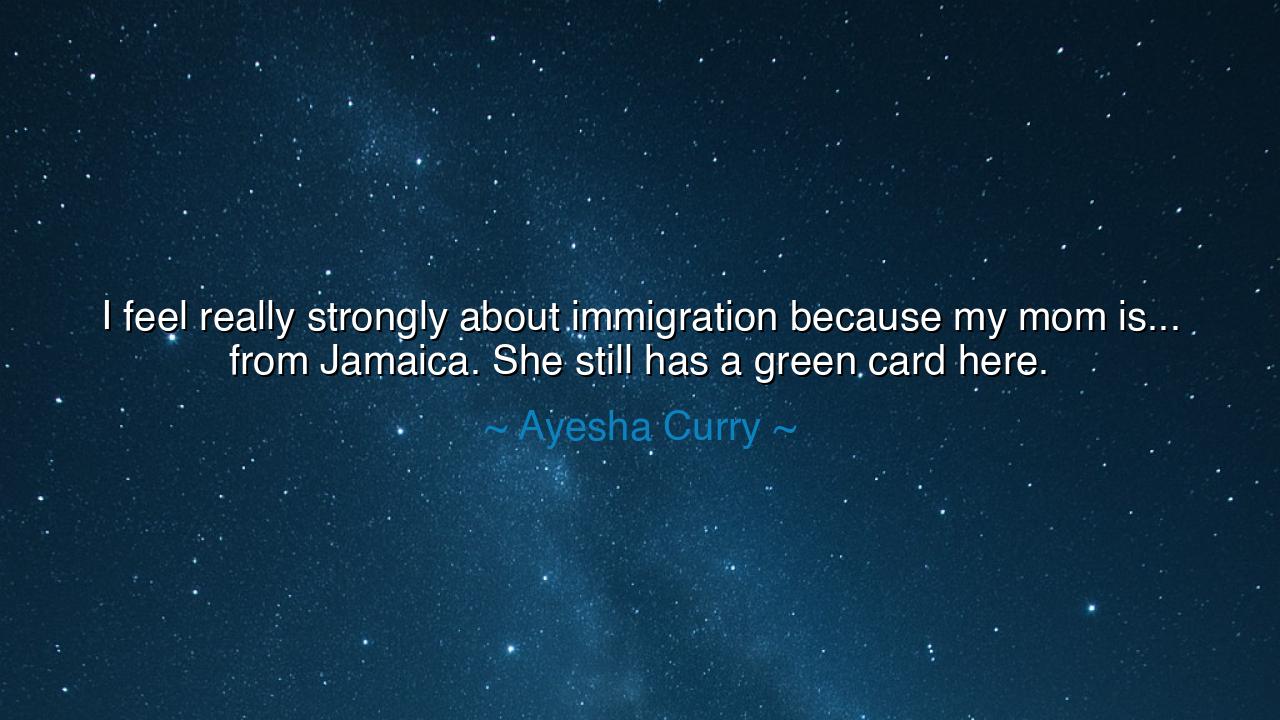
I feel really strongly about immigration because my mom is...
I feel really strongly about immigration because my mom is... from Jamaica. She still has a green card here.






There is heartfelt sincerity and moral strength in the words of Ayesha Curry, who said, “I feel really strongly about immigration because my mom is… from Jamaica. She still has a green card here.” In this statement, there beats the rhythm of gratitude and remembrance — the acknowledgment that behind every life lived in freedom, there are generations who crossed oceans, faced barriers, and built new beginnings with courage. Her words are not political, but deeply human, born from love and awareness of her family’s story. They remind us that immigration is not an abstract issue, but a legacy of sacrifice and hope carried within the veins of every child whose parents dreamed of a better world.
The origin of this quote lies in Curry’s reflection on her mother, Carol Alexander, who came to the United States from Jamaica, carrying both her culture and her determination. In sharing this, Ayesha is not simply stating a fact — she is testifying to the foundation of her identity. Her mother’s journey, her perseverance as an immigrant, became the soil from which Ayesha’s success and confidence grew. To say “she still has a green card” is to remind us that the immigrant spirit endures — humble yet unbreakable — always building, contributing, and loving a country that is both adopted and transformed by those who arrive seeking belonging.
The ancients, too, spoke of the sacredness of journey and belonging. In the stories of old, migration was not shame but destiny. The Hebrews wandered through deserts in search of promise; the Greeks told of Odysseus, a traveler whose heart was always torn between where he came from and where he must go. To leave one’s homeland is to live a story of courage and faith — to walk into the unknown carrying only memory and hope. Curry’s mother, like those ancient wanderers, embodies this same eternal pattern. And her daughter, by speaking with pride of her roots, honors not just her family, but all who have walked that road before.
History offers countless mirrors of this truth. Consider Alexander Hamilton, born on the small island of Nevis in the Caribbean, who rose from obscurity to become one of the architects of the American Republic. He, too, was the child of migration — driven by ambition, tempered by hardship, sustained by faith in what could be built rather than what was lost. In him, as in Curry’s mother, we see how the immigrant heart contributes not just to one family, but to an entire nation’s soul. It is through these journeys that nations renew themselves, drawing strength from those who dare to begin again.
Ayesha’s quote also carries a gentle but powerful moral awareness. By saying, “I feel really strongly about immigration,” she reminds us that gratitude must lead to empathy. Those who know the sacrifices of their parents cannot turn away from others who seek the same chance. Her perspective is not theoretical — it is personal truth turned into compassion. She recognizes that immigration is not merely about policy or papers, but about human lives — mothers, fathers, and children who carry both their old world and their new one within them. Through this awareness, she teaches that identity is never solitary; it is shared, inherited, and constantly renewed through understanding.
In her words also lies a reminder of intergenerational harmony — the balance between heritage and assimilation, between pride in where one comes from and love for where one is. The immigrant story, at its best, does not erase roots but deepens them. It teaches the children of immigrants, like Ayesha, that strength is born from multiplicity — from being shaped by more than one place, more than one culture, more than one dream. The mother’s journey becomes the daughter’s vision; what was once survival becomes purpose.
The lesson, my children, is eternal: never forget the hands that carried you to where you stand. Whether your ancestors crossed seas, deserts, or city streets, their journeys live within you. Let gratitude become advocacy; let pride become empathy. Honor your heritage not only with remembrance, but with action — by standing for justice, inclusion, and dignity for those who still walk the paths your family once walked.
For as Ayesha Curry reminds us, the immigrant’s story is the human story — the story of movement, of hope, of transformation. To remember it is to remember what binds us all: that we are travelers in time, descendants of courage, and inheritors of dreams. And when we speak with love, as she does, of those who came before us, we give thanks not only for our roots, but for the living promise that tomorrow, too, will belong to the brave.






AAdministratorAdministrator
Welcome, honored guests. Please leave a comment, we will respond soon